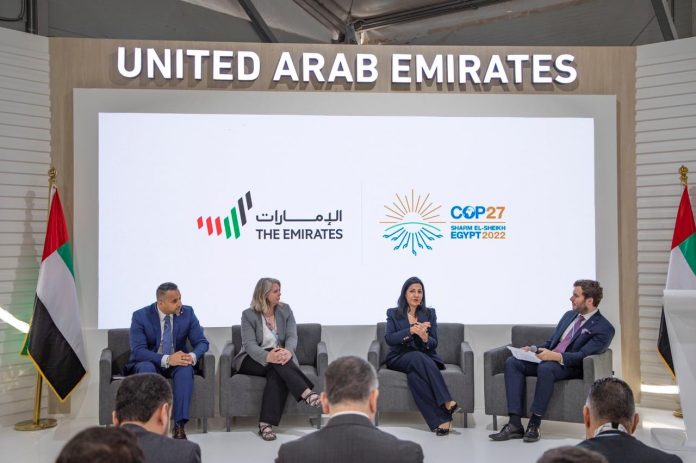First Abu Dhabi Bank (FAB) took part in a panel discussion at COP27 hosted by the Net Zero Banking Alliance (NZBA).
The panel, titled ‘Regional Perspectives: Net Zero Banking Alliance’ started with a forward-looking statement on the ambitions of the NZBA after nearly two years since its launch in April 2021.
The discussion turned to topics such regional considerations that can contribute towards the ongoing development of NZBA’s guidelines, as well as how more banks can be encouraged to join the NZBA.
The discussion was moderated by Harry Chapman, Head of Sustainability Events at The Economist Impact, and included panelists:
- Shargiil Bashir, Chief Sustainability Officer, First Abu Dhabi Bank – FAB
- Dalia Abdelkader, Chief Sustainability Officer, Commercial International Bank – CIB
- Sarah Kemmitt, Net Zero Banking Alliance, UN Secretariat Lead
Shargiil Bashir, said: “The word that best describes exactly what’s needed to achieve net-zero is ‘collaboration’. And since its inception in April 2021, NZBA has proven to be an important driver of impactful collaboration across the global banking sector. When FAB joined NZBA, we moved swiftly to align our portfolio and to meet the recommendations set out by the alliance. Our experience has been unique as the first UAE and GCC bank to join NZBA – and as we continue our journey toward decarbonisation we urge NZBA to continue their work with regional focus so that many other banks will join the alliance. It’s only through collaboration, aligned frameworks, and alliances that we will all be able to achieve the ambitious target of net-zero.”
Eric Usher, UNEP FI Head added: “FAB and other members of the Net-Zero Banking Alliance are successfully implementing the future of banking in the Middle East and African (or MENA) context. At this event, we look forward to celebrating progress and exploring opportunities for further progress in the region.”
The panel took place around one year on since First Abu Dhabi Bank (FAB) joined NZBA becoming the first UAE and GCC bank to join the alliance and in doing so committing to net-zero by 2050.










